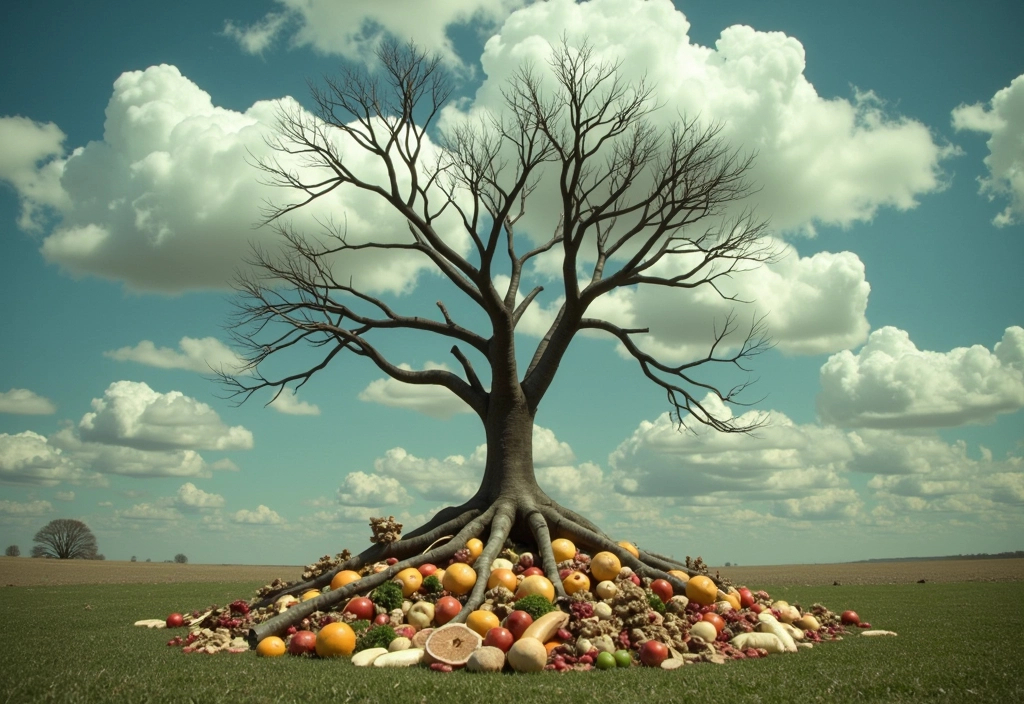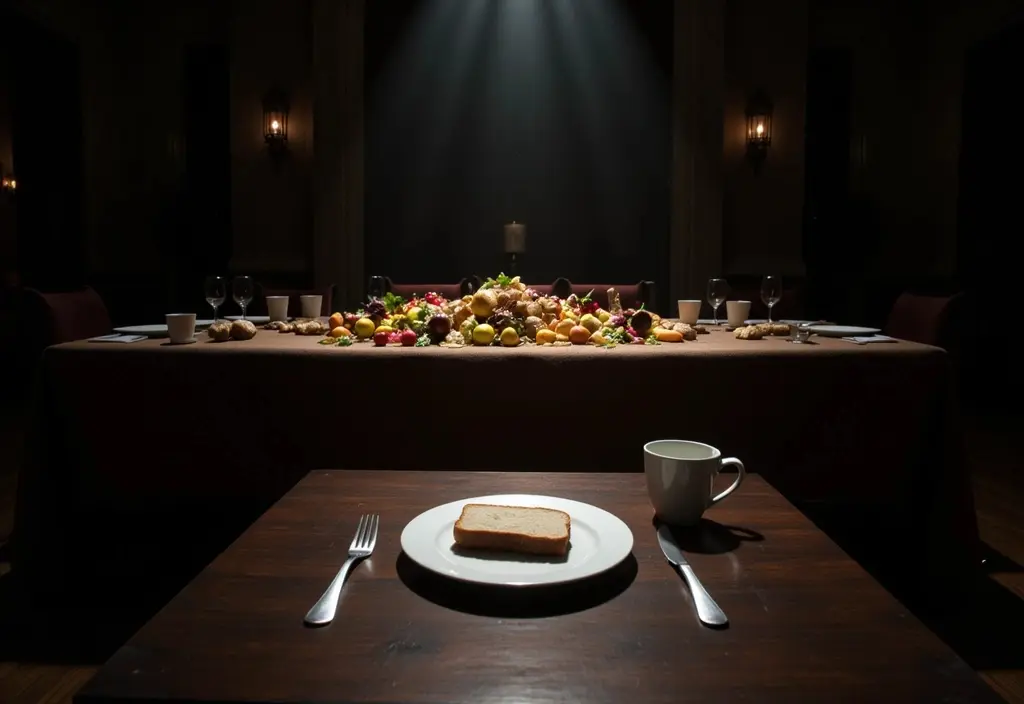We all know the feeling. Let’s just be honest about it. That post-Thanksgiving bloat, where your waistband digs in and you swear off food for life. Or maybe it’s the mystery of the vanished family-sized chip bag during a movie night. It’s gone. Our culture gets a good laugh out of overeating, treating it like a harmless quirk. But what if it’s something more? The Bible has a name for it: gluttony. And digging into what the Bible says about gluttony is about so much more than feeling bad about what you ate.
It’s about the heart.
The word “gluttony” sounds like something out of a stuffy old book, doesn’t it? But the wisdom in Scripture, especially in a blunt passage like Proverbs 23:20-21, speaks directly to our world of endless buffets and super-sized everything. This isn’t about food-shaming. It’s not a new diet plan. It’s an invitation to find real freedom by asking a tough question: who’s in charge here? Is it God, or is it my stomach? The answer changes everything.
More in Ethics & Morality Category
What the Bible Says About Hate
What the Bible Says About Holding Grudges
Key Takeaways
- Gluttony is a Heart Problem: The Bible sees gluttony not just as eating too much, but as an out-of-control desire for food that points to a heart that loves comfort more than God.
- Proverbs 23 Gives a Direct Warning: This passage is crystal clear: steer clear of people who live for indulgence, because a destructive lifestyle is contagious and leads to ruin.
- It’s a Dead-End Street: Scripture consistently shows that a gluttonous lifestyle leads to disaster—poverty, laziness, shame, and a spiritual numbness.
- Self-Control is a Supernatural Gift: The solution isn’t just trying harder. Biblical self-control is a fruit of the Holy Spirit, something that grows in us as we surrender our appetites to God.
- Feasting is a Good Thing: God made food to be enjoyed. The Bible is filled with parties and celebrations. The line is crossed when we start worshipping the gift instead of the Giver.
So, What Is Gluttony, Really, According to the Bible?
Okay, before we dissect Proverbs 23, let’s get our terms straight. When the Bible talks about gluttony, it isn’t pointing a finger at someone for having a second piece of cake. The issue goes much deeper. Gluttony is an inordinate desire. It’s that moment when your appetite crosses a line from a simple need to a ruling passion. It becomes a craving that bosses you around, hijacking your thoughts.
Think of it like this. Food is an amazing gift. God designed us to need it, but he also created a world of incredible flavors for us to simply enjoy. That’s why 1 Corinthians 10:31 says, “So whether you eat or drink or whatever you do, do it all for the glory of God.” Even eating can be an act of worship when your heart is full of thanks.
Gluttony is the corruption of that good gift. It’s when you switch from “eating to live” to “living to eat.” The gift becomes a god. The pleasure of the meal is no longer a pointer to the Giver’s goodness; it becomes the ultimate goal itself. It’s a disordered love—placing the body’s cravings above the soul’s need for God. Grasping this is the key to understanding all the Bible’s warnings.
Why Do the Words in Proverbs 23:20-21 Hit So Hard?
Read the verse for yourself. Written by Solomon, a king famous for his wisdom, this is straight talk for real life.
“Do not join those who drink too much wine or gorge themselves on meat, for drunkards and gluttons become poor, and drowsiness clothes them in rags.” (Proverbs 23:20-21, NIV)
That isn’t a gentle suggestion. It’s a command. A direct warning. Solomon is looking past the plate of food and seeing the powerful effect of our friends and habits. He’s showing that our choices today create our reality tomorrow. This verse is a powerful blend of social advice and an economic warning, all circling back to self-control.
Who Are These “Companions” We Should Avoid?
The warning kicks off with our associations: “Do not join those…” This is so insightful. People say we’re the average of the five people we spend the most time with. Solomon knew that thousands of years ago. The habits and values of your friends will rub off on you. If your circle’s main idea of fun is over-the-top indulgence, that will eventually become your normal.
It takes me back to my freshman year of college. I fell in with a group of guys whose entire week revolved around finding the cheapest pizza buffet and planning the weekend’s drinking. That was it. That was our culture. We didn’t just eat; we held eating contests. It was a point of pride. At the time, I thought it was just guys being guys, harmless fun. But looking back, I see Solomon’s wisdom so clearly. That lifestyle produced laziness in my studies, constantly drained my wallet, and created a spiritual fog I couldn’t explain. I was doing exactly what he warned against, and I was starting to wear the consequences.
What’s This Connection Between Gluttony and Poverty?
The verse then connects indulgence directly to ruin: “…for drunkards and gluttons become poor, and drowsiness clothes them in rags.” This isn’t poetry. It’s cause and effect. Simple. Brutal.
How does it work?
First, the obvious: cash. A lifestyle of “gorging on meat” and constant drinking costs a lot of money. When you’re always chasing that next big meal, you’re burning through resources that could be saved, invested, or used to care for your family. It’s a slow leak that eventually sinks the whole ship.
But the second reason is maybe more devastating. It’s the impact on your character. The verse mentions “drowsiness.” We’ve all felt the “food coma.” A life built on gluttony creates a permanent state of lethargy. It saps your energy. It dulls your mind. This drowsiness isn’t just about needing a nap; it’s a way of being. A person who is never fully sharp, never motivated, and always just seeking comfort will not be a productive person. They’ll miss opportunities, underperform, and eventually find themselves, as the Proverb so graphically states, clothed “in rags.”
Is Gluttony Actually One of the Seven Deadly Sins?
You’ve likely heard of the “Seven Deadly Sins,” that list of pride, greed, wrath, envy, lust, gluttony, and sloth. While the Bible doesn’t list them out like that in one spot, it’s a solid theological tradition that nails the root problems that lead to other sins. The concepts are biblical through and through, and gluttony absolutely belongs there.
The Bible condemns the heart behind it over and over. Proverbs 28:7 says, “…a companion of gluttons disgraces his father,” linking the sin to family shame.
But the Apostle Paul delivers the knockout punch in Philippians 3:18-19: “For, as I have often told you before and now tell you again even with tears, many live as enemies of the cross of Christ. Their destiny is destruction, their god is their stomach, and their glory is in their shame. Their mind is set on earthly things.”
“Their god is their stomach.”
That one line should stop us cold. Paul elevates this from a simple bad habit to full-blown idolatry. When satisfying your stomach becomes your life’s mission, your main source of comfort, and the thing you think about all day, you have a new god. You are worshipping your own appetite—the creation—instead of the Creator. That is why it’s “deadly.” It’s a flashing red light on the dashboard of the soul, warning that the heart is seeking satisfaction in the wrong place.
How Did Biblical Figures Deal with This?
This isn’t just our problem. It’s a human problem. The Bible is full of stories of people and nations getting derailed by their appetites.
Did Israel’s Time in the Desert Teach Us About Cravings?
One of the most stunning examples is Israel in the wilderness. In Numbers 11, these people had just been miraculously freed from slavery. God was feeding them supernaturally with manna, a bread from heaven. It was perfect. But it wasn’t what they wanted.
They started whining about the food they had in Egypt—the fish, the cucumbers. Their craving for a specific taste completely erased their gratitude for freedom and daily miracles. This wasn’t hunger; it was lust. God’s reaction was severe. He sent them so much quail it made them sick, and then a plague followed. The lesson is harsh: God despises a complaining heart that rejects his perfect gifts to chase its own cravings.
What About That Parable of the “Rich Fool”?
Jesus tells a chilling story in Luke 12 about a rich man with a bumper crop. His first thought wasn’t gratitude or charity. It was all about him.
He thought, “I’ll build bigger barns… And I’ll say to myself, ‘You have plenty of good things laid up for many years. Take life easy; eat, drink and be merry.'”
His whole worldview was gluttonous. He saw his blessings as fuel for his own endless indulgence. God’s verdict was swift. “You fool! This very night your life will be demanded from you.” The man made comfort his god, and he lost his soul in the process.
I Struggle with This. Where Is the Hope in the Bible?
Reading all this can feel heavy, especially if food is a real struggle for you. It’s easy to feel trapped in shame. But the Bible never diagnoses a problem without offering a cure rooted in grace. The goal isn’t to make you feel bad; it’s to set you free.
What Does It Mean That My Body Is a Temple?
One of the most life-altering truths in the New Testament is in 1 Corinthians 6:19-20: “Do you not know that your bodies are temples of the Holy Spirit, who is in you, whom you have received from God? You are not your own; you were bought at a price. Therefore honor God with your bodies.”
This changes the whole game. The fight against gluttony is no longer about a diet. It’s about stewardship of a holy place. If you’re a Christian, your body is literally where God’s Spirit lives. That’s a huge deal.
For years, my coping mechanism was comfort food. After a stressful day or a tense argument, my first instinct was to find relief in a tub of ice cream, not in prayer. I was trying to fill a spiritual hole with a physical thing. Meditating on this “temple” passage was a turning point. It helped me see that when I abused my body with food, I was doing more than breaking a rule. I was disrespecting the sacred space God had chosen to dwell. I was dishonoring the temple. That thought shifted my motivation from guilt to a desire for honor.
How Can I Find Self-Control When I Feel Powerless?
If the answer were as simple as “just try harder,” nobody would struggle. Our willpower is a finite resource. The biblical solution is supernatural. In Galatians 5:22-23, self-control is listed as a Fruit of the Spirit.
Think about that. A tree doesn’t strain to produce fruit. An apple tree produces apples because it’s a healthy apple tree connected to its roots. In the same way, real, lasting self-control isn’t something we can just manufacture. It grows in us as we stay deeply connected to Jesus.
This leads to some very real, practical steps:
- Pray Honestly: Just tell God. Stop hiding or downplaying it. Admit where you are weak and ask the Holy Spirit to start growing that fruit of self-control right in that broken place.
- Change Your Mind’s Channel: The battle is won or lost in your thoughts. When a craving screams for attention, consciously change the channel. Meditate on a verse of Scripture instead of on the food. Shift your focus from the temporary to the eternal.
- Practice Fasting: Fasting isn’t a crash diet; it’s a spiritual workout. It’s the act of telling your body “no” to sharpen your spiritual hearing and increase your dependence on God. You’re training your body to listen to your spirit, not the other way around.
- Find a Good Ally: Proverbs warns about bad company. The opposite is also true. Find a trusted Christian friend you can be real with, someone who will pray for you and offer grace-filled encouragement.
How Do I Know the Difference Between a Feast and Gluttony?
This is a vital question, because a joyless life is not the goal. God is not anti-pleasure! The Bible is full of parties, feasts, and celebrations where people are encouraged to enjoy what God has given. Jesus’ first miracle, after all, was at a wedding feast!
The difference is in the heart. Learning to spot the line between godly celebration and gluttonous indulgence is key. Ask yourself:
- What’s my heart’s attitude? Am I thankful to the Giver, or am I just obsessed with the gift?
- Who’s in control? Can I stop when I’m satisfied, or does the food have power over me?
- How does this affect others? Is my consumption wasteful or inconsiderate? In the Bible, a real feast often meant sharing with the poor.
- What’s the long-term result? Is my relationship with food making me healthier and more energetic to serve God, or is it dragging me toward the “drowsiness and rags” of Proverbs?
How Is Modern Culture Pouring Fuel on This Fire?
If Solomon was concerned about gluttony in his day, it’s hard to imagine what he’d think of ours. We live in a world that is basically engineered to make us overconsume. Portion sizes have ballooned in what researchers call “portion distortion.” A study from a major institution like Penn State University confirms what we already know: when they serve you more, you eat more, often without thinking. Our idea of a “normal” meal is completely out of whack.
Every day, we’re slammed with ads for foods packed with sugar, fat, and salt—ingredients designed to be addictive. Social media is a constant parade of over-the-top, decadent food. We have normalized a level of consumption that would have been unimaginable for most of history.
This constant cultural noise makes the Bible’s call to self-control both harder and more critical than ever. It means we have to be different on purpose. It requires a conscious, prayerful choice to reject the world’s mantra that more is always better and that our cravings are king.
Finding the Path to Freedom
Facing what the Bible says about gluttony can be humbling. It shines a light on a part of our lives we’d rather keep in the shadows. But the final message isn’t judgment; it’s incredible hope. The Bible’s warnings are like guardrails on a mountain road. They aren’t there to block the view, but to keep you from going over the cliff.
The path to freedom from gluttony isn’t a new diet. It is the daily, moment-by-moment journey of surrendering our appetites, our desires, our very bodies to the loving authority of Jesus Christ. It’s about discovering that our deepest satisfaction will never be found on a plate, but only in a relationship with God Himself. He is the one who gives us the grace to say “no” to our flesh and “yes” to His Spirit. And in Him, we find the real freedom to enjoy the good gifts He gives, without ever letting them take His place.
FAQ – What the Bible Says About Gluttony

In what ways does modern culture encourage overconsumption and how does this affect Christian living?
Modern culture promotes overconsumption through larger portion sizes, addictive food ingredients, advertising, and social media. This relentless exposure to excess makes it harder to practice self-control, requiring Christians to intentionally reject the world’s messages and prioritize biblical values of moderation and gratitude to maintain spiritual and physical health.
How can I differentiate between a godly celebration and gluttony?
The difference lies in the attitude of the heart, control over consumption, consideration for others, and long-term impact. Celebrations are appropriate when they reflect gratitude to God, are marked by moderation, sharing, and do not become an obsession or source of wastefulness.
What practical steps can I take to overcome gluttony?
Practical ways to combat gluttony include praying honestly about your struggles, consciously changing your focus from food to Scripture during cravings, practicing fasting to build spiritual resilience, and seeking accountability and support from trusted Christian friends who can pray with and encourage you.
How is gluttony connected to idolatry according to Scripture?
Scripture, particularly Philippians 3:19, describes the heart behind gluttony as serving ‘the stomach,’ which signifies making physical desires an idol. When satisfying the appetite becomes the main focus of life, it replaces God’s place as the ultimate source of satisfaction, turning the craving into a form of worship.
What does the Bible say about gluttony?
The Bible views gluttony as a heart problem rooted in the love of comfort and indulgence more than love for God. Proverbs 23:20-21 warns against overindulgence, linking it to ruin, poverty, and spiritual numbness. It emphasizes that gluttony is more than eating too much; it is an inordinate desire that can lead to destructive lifestyles.




